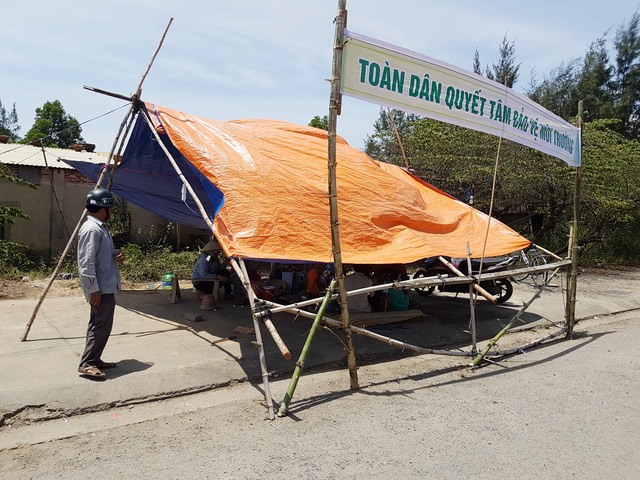 Environment
Environment

Residents of the central province of Quảng Nam poured into the streets recently to protest against the Viet-Phap Steel Company, blamed for causing severe pollution in Tam Kì City.
 |
| Residents of the central province of Quảng Nam poured into the streets recently to protest against the Viet-Phap Steel Company, blamed for causing severe pollution in Tam Kỳ City. — Photo tamky.com |
QUẢNG NAM – Residents of the central province of Quảng Nam poured into the streets recently to protest against the Viet-Phap Steel Company, blamed for causing severe pollution in Tam Kỳ City.
“Since its establishment in 2009, we cannot live in peace. We are asking them to move somewhere else,” said Võ Như Quảng, whose home is close to the steel plant.
The pressure worked, and on July 26, the Quảng Nam Province People’s Committee decided to move the Viet- Phap steel plant to the less populated mountainous district of Nam Giang.
Despite its happy outcome, the protest highlights a somewhat underexposed problem of the pollution generated by Việt Nam’s steel industry.
Writing recently in the "Việt Nam Environment Administration Magazine", Nghiêm Gia from the Việt Nam Association of Foundry and Metallurgy said Vietnamese steel enterprises must put in place measures to balance economic growth with environmental protection.
Gia wrote that there are 300 small and medium-size steel enterprises in Việt Nam. These companies provide jobs and contribute to national economic development. However, due to their relatively small sizes, they lack proper waste treatment systems and cause pollution.
Steelmaking is a heavy industry and its slags are hazardous to the environment and humans. Solid waste, gas, dust and wastewater are released in every step of the production. Wastewater consists of machine-cooling water and liquid side-products which contain oil, minerals, dust, iron oxide and other pollutants.
The manufacturing of one tonne of iron discharges 0.5 to 1 tonne of slag, 10,000 cubic metres of gas, 100kg of dust and pollutants like acid or alkali. Dust from steelmaking contains metal oxides and greenhouse gases harmful to the biosystem and human life.
At a National Assembly meeting late 2016, Industry and Trade Minister Trần Tuấn Anh said Việt Nam’s steel enterprises and enforcement authorities need to take various actions to raise awareness of the impacts of pollution.
“I stress that we are not by any means exchanging the environment for economic profits and industrial projects,” Anh pledged.
On the other hand, Bùi Huy Tuấn from Việt Nam Steel Corporation, recommended enhancing education and training for managers. International co-operation in exchanging technology and environmental protection expertise was also encouraged.
Applying innovation in steelmaking is another solution. Effective energy use programmes are applied at some steel factories, such as Thái Nguyên Steel Company or Đà Nẵng Steel Company. They aim to promote sustainable manufacturing and technology innovation to improve production efficiency in factories.
“To meet environmental requirements in operating waste treatment systems, we apply several solutions such as using heat-resistant dust filter bags; build recirculating tanks to reduce wastewater disposing to environment, set up the heat exchangers to ultilise heat of furnaces or dry FO oil for better savings”, said Trần Tuấn, Deputy Director of Lưu Xá Steel Plant under Thái Nguyên Steel Company.
Tuấn added that planting trees should be encouraged to help absorb CO2.
Those solutions will help prevent pollution, decrease waste and limit negative impact on the environment. It should go hand-in-hand with improving waste management system, investing in efficient projects and attracting aditional investment, experts say. — VNS




